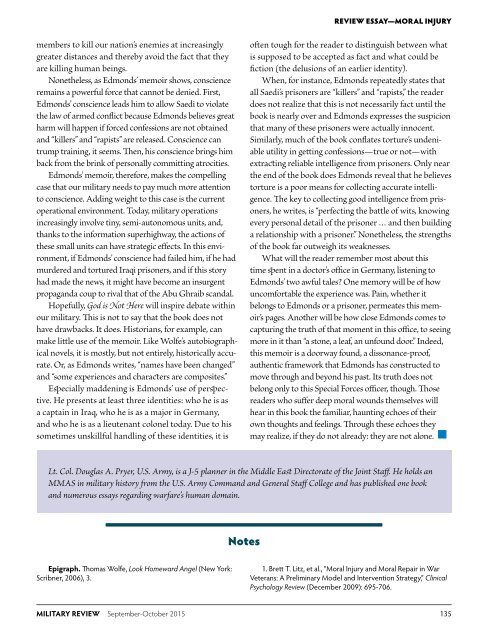Heel
s7u3wR
s7u3wR
Create successful ePaper yourself
Turn your PDF publications into a flip-book with our unique Google optimized e-Paper software.
REVIEW ESSAY—MORAL INJURY<br />
members to kill our nation’s enemies at increasingly<br />
greater distances and thereby avoid the fact that they<br />
are killing human beings.<br />
Nonetheless, as Edmonds’ memoir shows, conscience<br />
remains a powerful force that cannot be denied. First,<br />
Edmonds’ conscience leads him to allow Saedi to violate<br />
the law of armed conflict because Edmonds believes great<br />
harm will happen if forced confessions are not obtained<br />
and “killers” and “rapists” are released. Conscience can<br />
trump training, it seems. Then, his conscience brings him<br />
back from the brink of personally committing atrocities.<br />
Edmonds’ memoir, therefore, makes the compelling<br />
case that our military needs to pay much more attention<br />
to conscience. Adding weight to this case is the current<br />
operational environment. Today, military operations<br />
increasingly involve tiny, semi-autonomous units, and,<br />
thanks to the information superhighway, the actions of<br />
these small units can have strategic effects. In this environment,<br />
if Edmonds’ conscience had failed him, if he had<br />
murdered and tortured Iraqi prisoners, and if this story<br />
had made the news, it might have become an insurgent<br />
propaganda coup to rival that of the Abu Ghraib scandal.<br />
Hopefully, God is Not Here will inspire debate within<br />
our military. This is not to say that the book does not<br />
have drawbacks. It does. Historians, for example, can<br />
make little use of the memoir. Like Wolfe’s autobiographical<br />
novels, it is mostly, but not entirely, historically accurate.<br />
Or, as Edmonds writes, “names have been changed”<br />
and “some experiences and characters are composites.”<br />
Especially maddening is Edmonds’ use of perspective.<br />
He presents at least three identities: who he is as<br />
a captain in Iraq, who he is as a major in Germany,<br />
and who he is as a lieutenant colonel today. Due to his<br />
sometimes unskillful handling of these identities, it is<br />
often tough for the reader to distinguish between what<br />
is supposed to be accepted as fact and what could be<br />
fiction (the delusions of an earlier identity).<br />
When, for instance, Edmonds repeatedly states that<br />
all Saedi’s prisoners are “killers” and “rapists,” the reader<br />
does not realize that this is not necessarily fact until the<br />
book is nearly over and Edmonds expresses the suspicion<br />
that many of these prisoners were actually innocent.<br />
Similarly, much of the book conflates torture’s undeniable<br />
utility in getting confessions—true or not—with<br />
extracting reliable intelligence from prisoners. Only near<br />
the end of the book does Edmonds reveal that he believes<br />
torture is a poor means for collecting accurate intelligence.<br />
The key to collecting good intelligence from prisoners,<br />
he writes, is “perfecting the battle of wits, knowing<br />
every personal detail of the prisoner … and then building<br />
a relationship with a prisoner.” Nonetheless, the strengths<br />
of the book far outweigh its weaknesses.<br />
What will the reader remember most about this<br />
time spent in a doctor’s office in Germany, listening to<br />
Edmonds’ two awful tales? One memory will be of how<br />
uncomfortable the experience was. Pain, whether it<br />
belongs to Edmonds or a prisoner, permeates this memoir’s<br />
pages. Another will be how close Edmonds comes to<br />
capturing the truth of that moment in this office, to seeing<br />
more in it than “a stone, a leaf, an unfound door.” Indeed,<br />
this memoir is a doorway found, a dissonance-proof,<br />
authentic framework that Edmonds has constructed to<br />
move through and beyond his past. Its truth does not<br />
belong only to this Special Forces officer, though. Those<br />
readers who suffer deep moral wounds themselves will<br />
hear in this book the familiar, haunting echoes of their<br />
own thoughts and feelings. Through these echoes they<br />
may realize, if they do not already: they are not alone.<br />
Lt. Col. Douglas A. Pryer, U.S. Army, is a J-5 planner in the Middle East Directorate of the Joint Staff. He holds an<br />
MMAS in military history from the U.S. Army Command and General Staff College and has published one book<br />
and numerous essays regarding warfare’s human domain.<br />
Notes<br />
Epigraph. Thomas Wolfe, Look Homeward Angel (New York:<br />
Scribner, 2006), 3.<br />
1. Brett T. Litz, et al., “Moral Injury and Moral Repair in War<br />
Veterans: A Preliminary Model and Intervention Strategy,” Clinical<br />
Psychology Review (December 2009): 695-706.<br />
MILITARY REVIEW September-October 2015<br />
135


